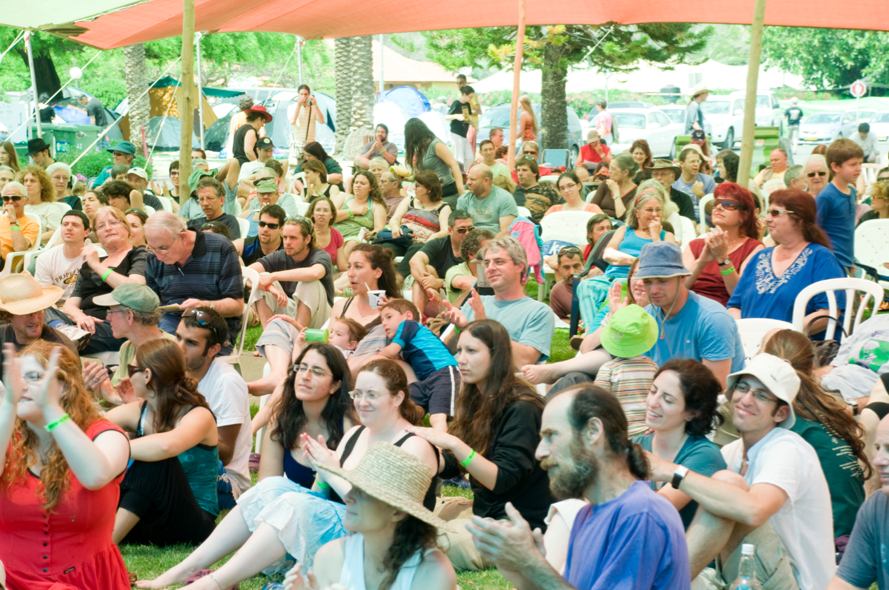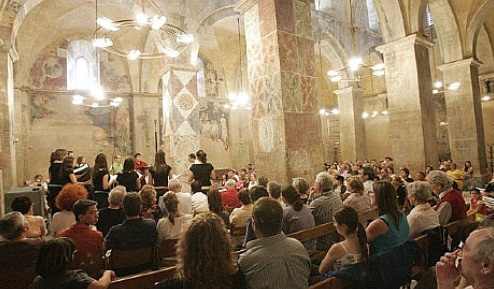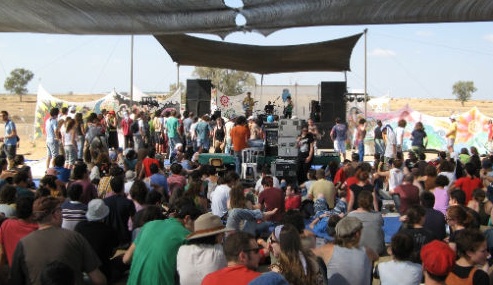Israel is too often perceived through an exclusively political, religious or historical lens. An equally compelling current for locals is music. The country is chock-a-block full of music festivals. Whether your preference runs to jazz, rock, classical, choral, rap or klezmer; whether you enjoy the desert, the mountains or the heart of the city, you’ll find an event tailored to your taste.
For this article, I culled dozens of music festivals from across the country. Only festivals that are exclusively musical were included, rather than more broadly defined events that also include music (such as the annual Jerusalem Arts and Crafts Festival, that features a nightly concert).
In random order, here are Israel’s Top Ten Music Festivals:
Yehudit and Menahem Vinegrad, two immigrants from the UK, bemoaned the lack of quality folk music when they arrived in Israel in the late 1960s. Their response was to start Jacob’s Ladder, a festival that, from modest beginnings on a muddy kibbutz hill in 1978, has grown to become a wonderfully homey, folk music event that attracts talent from around the world and thousands of revelers within the country.
Jacob’s Ladder is now held twice a year at Kibbutz Nof Ginosar on the shores of the Sea of Galilee. Most attendees pitch tents for the three days of nearly non-stop folk, country rock and a smattering of blues from some 45 different performers. A Canadian bluegrass combo, The Abrams Brothers, headlined for several years, with Celtic music taking the main stage in 2010. On Friday nights there’s an Irish music jam session that stretches into the wee hours.
Jacob’s Ladder is known as an “Anglo” festival although, over the years, a good number of Israelis have joined in. The laid-back atmosphere is renowned for safety (theft is rare) and cleanliness (everyone pitches in to pick up the trash at the festival’s end).
2. Abu Ghosh Vocal Music Festival
Classical music fans rejoice every year during the September/October Succot holiday and then again in May/June at Shavuot, when the Israeli Arab village of Abu Ghosh is transformed into one large concert hall. Centered in the historic Kiryat Yearim church, with street performances popping up in the alleys, groves and grottos of the village, the festival features Israeli orchestras performing choral works.
This past Succot, one could enjoy the music of Schubert, Bach, Mozart and Brahms with a special “baroque hit parade” thrown in for good measure. Curiously, there was also a one-off program saluting folk music stars of the 1960s.
The festival was launched in 1957, but took a 20-year break from 1971-1992. Thousands of Israelis attend, especially from Jerusalem, which is only a 10-minute car ride away.
3. Guitar Festival in the Desert
A relative newcomer to the Israeli festival scene, the Guitar Festival of the Desert, as its name indicates, is a celebration of all things guitar. It takes place in the Negev Desert between Beersheba and Mitzpe Ramon and has positioned itself as a family-friendly event, with kids under five admitted for free and under 12s paying half price.
The two-day lineup is impressive, with a mix of up-and-coming and veteran Israeli performers, which in past years has included Yael Deckelbaum, Tree, Dudu Tasa, the Coldplay-esque Miss Flag, and even ’80s hit maker Corrine Elal.
The keyboard and horn-free show also features guitar workshops, open mic stages, and nightly jam sessions. If you get sick of the picking, there are regular yoga classes, too.
The Guitar Festival is held in the fall, when the desert weather is a perfect antidote to the rain that is (hopefully) blanketing points further north. Accommodation is primarily campsites; you can rent a tent.
4. In-D-Negev
In-D-Negev is held at around the same time and not too far away from the Guitar Festival. It’s a musical extravaganza in the desert of a very different kind. Now in its fourth year, its name is a play on words that emphasizes its focus on Israeli “indie” rock music.
Ever heard of Lovegrenade? How about Mad Bliss, The Aprons or the Underwater Fireman? No? Then In-D-Negev should be an ear-opening experience. The festival runs for three days and attracts upwards of 4,000 music lovers who pitch their tents in an open area next to Kibbutz Gvulot, home to one of its co-founders.
Gvulot was established in 1943 to explore ways in which agriculture could flower in the desert. That mission has been expanded to help independent bands to blossom in a supportive environment where everyone gets their 15 minutes of fame. If it weren’t for Gvulot, the bands might be relegated to basement clubs in seedy parts of Tel Aviv.
Jazz music aficionados head down to Eilat every August for the annual four-day Red Sea Jazz Festival, which features nine concerts a night, six “clinics” with guest artists, and popular nightly jam sessions. The music ranges from New Orleans jazz to big band, Latin and World music.
The venue is big – there are indoor and outdoor spaces with as many as 4,000 seats overlooking the water at the Eilat Port – and the festival attracts many overseas performers. Original compositions by local musicians and a nightly showcase of youth jazz bands are part of the mix.
Since its inception in 1987, the festival has hosted a veritable who’s-who of international jazz stars, including Chick Corea, the Mingus Big Band, Tower of Power, The Manhattan Transfer, Ricki Lee Jones and Spyro Gyra.
Imagine rocking out to some of Israel’s top rock performers at sunrise on Masada. That’s a highlight, but not all that the Tamar Festival, held annually during the intermediary days of Succot, has in store. Stages situated all around the Dead Sea area – one in a dry riverbed canyon, another in the botanical gardens at picturesque Kibbutz Ein Gedi – provide a well-deserved getaway for Israelis after the intensity of the Jewish High Holy Days.
Performers at past festivals have included Israelis Asaf Avidan and the Mojos, the Idan Reichel Project, Groovatron and MC Carolina; as well as Balkan Beat Box and US import Matisyahu.
The Tamar Festival runs for five days; the concerts are at night, so you can do some daytime sightseeing, hiking or just relaxing in a Dead Sea mineral spa.
Chances are that most members of the youthful audience at the annual Woodstock Revival Festival in Jerusalem weren’t even born when the seminal sixties concert took place at Max Yasgur’s farm in upstate New York. That hasn’t stopped this mostly Anglo crowd from grooving on the synthetic grass of the capital’s Kraft Stadium to a line-up of Israeli bands channeling the likes of The Who; Janis Joplin; Crosby, Stills, Nash and Young; and Jimi Hendrix.
The vibe for the Jerusalem Woodstock festival is more chill than party, although there is a teenage throng bopping away next to the stage. Performers have included blues maestro Ronnie Peterson doing songs from Bob Dylan (who wasn’t actually at the original Woodstock); popular Israeli singer/songwriter Geva Alon whose interpretation of Neil Young is spot-on; and Lazer Lloyd performing Jimi Hendrix in a foot-long scraggly beard and adding a local twist: an electrified version of HaTikva, Israel’s national anthem.
The festival is held in August, when Jerusalem’s mild nights are a welcome contrast to the blazing summer sun. One of the Woodstock Revival’s organizers quips that the event, taking place on the outskirts of some of Jerusalem’s more religious neighborhoods, is not about re-creating an atmosphere of free love, sex, drugs and rock ‘n’ roll. “The rock and roll part, yes. But not the other stuff,” he says.
Long known as European Jewish “soul music,” the Yiddish word klezmer originates from the Hebrew klei-zemer, meaning musical instruments. So it’s no surprise that the annual Klezmer Festival in the northern Galilee city of Safed is all instrumental.
Launched in 1988 and now featuring over 100 performances, the August festival fills every nook and cranny of the city, with outdoor shows playing in the picturesque narrow alleyways and courtyards of Safed’s artists’ quarter, as well as in the Red Mosque. Local artists set up their wares on craft tables along the main pedestrian walkways. The festival also includes a number of musicians playing tributes to the late singing Rabbi Shlomo Carlebach.
Despite the cramped layout, the festival attracts a whopping 10,000 to 15,000 klezmer enthusiasts, both religious and non-observant.
It’s also an interesting mix of Jewish traditions: Safed is considered the birthplace of Jewish mysticism and a major Hassidic base. The mash-up between the two often leads to surprising artistic creations.
9. Jerusalem International Oud Festival
One of the more unusual Israeli music festivals is dedicated to the oud, a Turkish instrument that looks a bit like a pear-shaped guitar and is played throughout the Middle East, from Syria to Armenia. The festival, which is held annually in November and organized by the Jerusalem Confederation House, takes place in Israel’s capital as well as in the city of Nazareth in the north.
The oud festival is a multicultural experience with concerts by Israeli, Arab, Indian and French performers. Other ethnic instruments played during the event include the zurna, duduk, jumbus, dahau and nai. In past years, there have been special programs presenting creative interpretations of the work of classic Jewish poets, such as Rabbi Yehuda Ibn Ezra, a literary giant of the Golden Age of Spain, as well as kabbalistic texts such as the Sefer HaYetzira.
The oud is an acquired taste, but those who enjoy its lilting, mysterious sound will appreciate this unique, only-in-Israel music festival.
10. Ein Gev Festival
The granddaddy of Israeli music festivals, the Ein Gev Festival, is now in its 66th year of showcasing Hebrew singing groups and choirs. Held at Kibbutz Ein Gev on the eastern side of the Sea of Galilee during the intermediary days of Passover, the festival hosts more than 70 vocal performances including every one of the country’s 300 singing groups, some of whom have been together for decades.
While still quite popular, the Ein Gev Festival is less cutting-edge than it was in its earlier years, when the event brought culture to the “distant” northern region of the country. These days, it appeals particularly to Israelis who enjoy following along with the nostalgic classics of the country’s pioneering days.
Every day offers free amateur choir performances as well as activities for the young (Grandpa Yossi’s Carpentry Shop) and young at heart (a guided cruise around the expansive lake).
Heavyweights of the classic Israeli songbook have joined the festival in past years, including Yehoram Gaon, Geula Gil, Hedva Amrani, Moshe Baker, Amotz Brontman, Nira Sapir and others.
This review of music festivals originally appeared in Israel21c.







